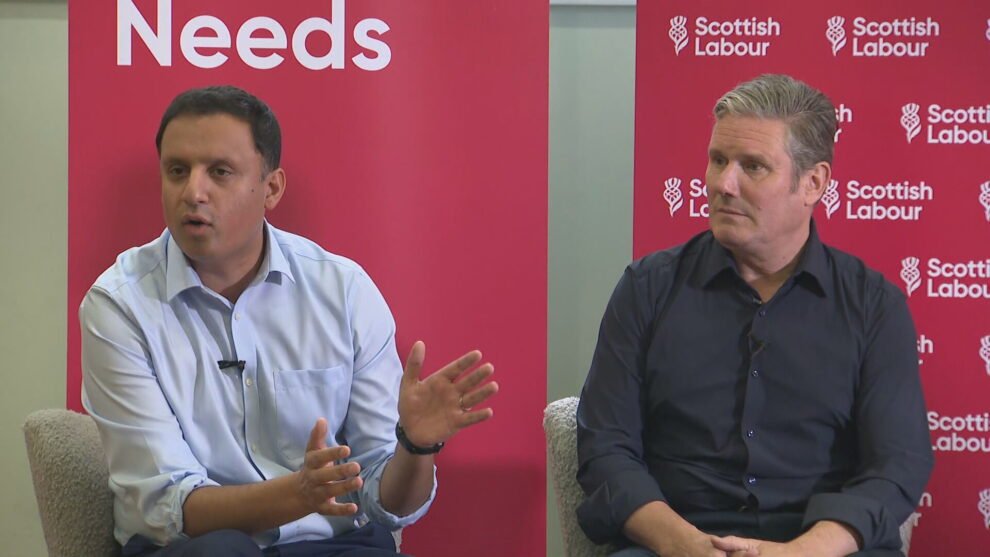Labour leader Sir Keir Starmer and his Scottish counterpart Anas Sarwar have denied they are divided ahead of a key by-election. Sir Keir told a party event in South Lanarkshire that the pair had “real clarity about shared objectives”. Mr Sarwar also played down differences over issues such as the two-child benefit cap. Meanwhile, the SNP described Labour’s Rutherglen and Hamilton West campaign as an “unfolding disaster.”
Earlier this month Margaret Ferrier, who was was suspended for breaking Covid lockdown rules, lost her seat after a petition by constituents.
A date has yet to be set for the by-election but the earliest it could happen would be 5 October. On Tuesday the Labour leaders held an “in conversation event” with supporters in Rutherglen.
After some questions from activists the leaders were asked by BBC Scotland News if their differences over the two-child benefit cap amounted to an “open goal” for political opponents.
Scottish Labour has said it opposes the cap – which blocks applicants from claiming Universal Credit or Child Tax Credit for a third child – despite UK leader Sir Keir insisting he would not scrap it.
In response, Mr Sarwar said: “There is no division. There is no divide. “There is of course a change in emphasis, you could argue, but it goes back to the point I made earlier on. “Devolution is not about disagreement, division, fighting or two governments battling with each other to try and pull communities apart.” Mr Sarwar said that he accepted the party could not go into elections with unfunded commitments but that Scottish Labour MPs would “expect” UK Labour to fight poverty.
He added: “My view has not changed that Labour was right to oppose the two child limit, it was right to campaign against it. “But I’m also honest about accepting that we cannot go into an election making unfunded spending commitments. “It would be wrong to say to people that we’re going to make promises that we can’t keep.”
Sir Keir said the session demonstrated the “shared objectives” of the UK and Scottish leaders “about where we want to get to and the change we want to bring about”. “There is no difference between us on that,” he added. “And when it comes to anti-poverty strategies I genuinely believe we have to be more ambitious than simply saying it is about a particular welfare payment.”
Last month Sir Keir said he would not commit extra money to benefits without first growing the economy. But ahead of his campaign visit, he promised Labour would “smash the glass ceiling” that holds working people back. “It means striking a new deal that will strengthen workers’ rights and finally make work pay. No more zero hour contracts, no more fire and rehire, and a real living wage for everyone,” he said.
“Singing from the same hymn sheet.” “Exact same wavelength.” “Welded together.”
Just in case you didn’t pick up on the message, these were a few of the phrases deployed by the Starmer/Sarwar double act this morning when stressing that there’s no division between them. Broadly speaking, this is true. These are two leaders who are obviously comfortable with each other’s politics.
But in a few policy areas they take different positions. And we’re in the white heat of a by-election where differences are put under the microscope. The two child benefit cap is one such policy. It’s not a devolved issue, but Scottish Labour oppose it. Sir Keir Starmer won’t pledge to scrap it if he’s prime minister.
Today it appeared that the two leaders found a form of words acceptable to both. Anas Sarwar accepts that the UK Labour Party can’t make unfunded pledges. And Sir Keir is promising that any government he leads will prioritise tackling poverty. The UK Labour leader also says that he’s open to making any policy work more fairly.
So, although fundamental position of both leaders hasn’t changed, the pair seem to now have a response that works for them both and stresses unity. But don’t expect the SNP to accept this explanation as we head towards an important by-election.
At the Rutherglen event, the UK Labour leader said the SNP, which won the seat back from Labour in 2019, had “imploded and run out of road”. Sir Keir also told the audience the constituency had UK-wide significance ahead of the general election and was a “stepping stone to the battle than we will have next year”. And he vowed his government would be “ambitious” not just when it comes to “a welfare payment or two” but would aim grow the economy across the UK. He insisted this would help to lift people out of poverty.
Sir Keir, a former director of public prosecutions, and ex-dentist Mr Sarwar also shared personal stories about how they had been shaped by their backgrounds and their experiences working in the public sector. Earlier, SNP deputy leader Keith Brown described Labour’s campaign as an “unfolding disaster.”
He told BBC Radio’s Good Morning Scotland programme: “What they are offering is the same as the Tories. It’s austerity. It’s Brexit. It’s the biggest fall in living standards in a generation.” Mr Brown said the scrapping the two-child cap would affect nearly 1,500 people in the constituency.
Asked about divisions in his own party, he said he would support the Bute House Agreement with the Scottish Greens being debated at its forthcoming conference if such a motion was brought forward – though he still backs the deal. On Monday the SNP’s former Westminster leader Ian Blackford said the party’s pact with the Greens would remain in place until 2026.
Mr Brown told the programme: “There is no question the SNP has challenges now on a number of issues. “I understand that point and that is probably no different from any other party at any given time. “But what we are is united in the fact that we believe the future in Scotland is not one portrayed by the Labour and Conservative parties, which is the ever increasing pressure on working families.”
In alphabetical order, the candidates confirmed for the Rutherglen and Hamilton West by election are data analyst Gloria Adebo (Scottish Liberal Democrats); Glasgow Shettleston councillor Thomas Kerr (Scottish Conservatives); Cambuslang councillor Katy Loudon (SNP); Teacher and activist Michael Shanks (Scottish Labour).
source: BBC











